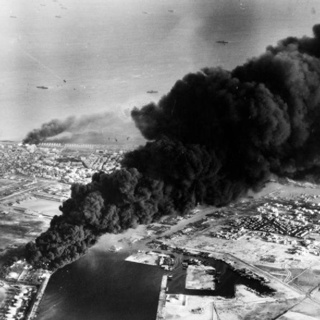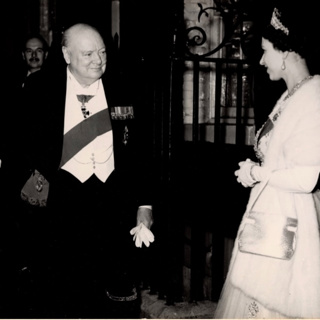
239. Winston back, Winston out
The old man was back. The Conservatives won the 1951 election and Winston Churchill returned to Downing Street. And he really was an old man – nearly 77 when he took office. To many, he it seemed increasingly clear that he was unfit for office, but he wouldn’t leave, clinging on, in the end, for three and a half years. He did get various things done. He presided over the ending of rationing. He allowed the British secret service to work with the Americans to bring down the democratically elected government in Iran, to protect British oil interests, a move whose consequences we’re still suffering from today. And he also did all he could to lessen the risk of the world wiping itself out in a war using Hydrogen bombs, far more destructive still than the bombs that had actually been used against Japan. He appointed a Home Secretary, David Maxwell Fyfe, who would use the full power of the law against gay sex to make life miserable for a lot of gay men. His most notable victim was Alan Turing, an outstanding scientist of his generation, persecuted, subjected to chemical castration, and driven to an early death, it seems pretty clear, by suicide.Fyfe also believed strongly in the death penalty, even though this was a time when a couple of particularly striking miscarriages of justice came to light, miscarriages that led to the execution of innocent men. It would take decades to clear their names. But the death penalty would not be abolished at that time.Churchill’s attempt to do something about the Hydrogen bomb was his last great initiative in office, his last international action, his last pretext for putting off resignation. It, however, failed. Even so, he hung on another eight months, with no obvious excuse for not going. Still, if he had no excuse, it's clear today that he may well have had an understandable reason, other than the natural instinct of men in power to cling on to it as long as possible.He may simply have had no confidence that his designated successor, Anthony Eden, was up to the job. Something we’ll be checking up on next week.Illustration: Winston Churchill seeing Queen Elizabeth II to her car after dinner at Downing Street the day before he left office. Public Domain.Music: Bach Partita #2c by J Bu licensed under an Attribution-NonCommercial-No Derivatives (aka Music Sharing) 3.0 International License
13 Apr 14min
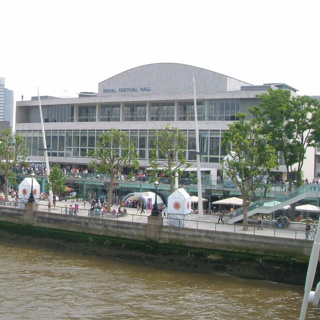
238. Decline to defeat
Circumstances seemed unfavourable for a Labour victory in a 1950 election but, when it was held, Attlee managed to lead his party to the second win in its history. It took a majority of the popular vote, and even a majority of parliamentary seats, though way down from its previous landslide to a mere five.With that small majority, it was poorly placed to deal with the continuing financial difficulties of the country. These were made worse by involvement in the Korean War, which meant rearming. The funds for the war had to be found somewhere, and the Chancellor of the Exchequer, a rising star of the Party, Hugh Gaitskell, decided that had to come in part from raiding the National Health Service and the Social Insurance Fund.In disgust, the architect of the health service, Nye Bevan, resigned from the government. With him went another young rising figure, Harold Wilson, who had become the youngest cabinet minister in Britain in the whole of the twentieth century. At that stage he stood with the left and with Bevan, though later he would turn on his mentor, taking a seat in the Shadow Cabinet when Labour was back in Opposition, a seat vacated precisely by another resignation on principle by Bevan.There were difficulties internationally too, with the Mossadegh government in Iran set to nationalise British oil industries there, and nationalist forces in Egypt putting pressure on the British garrison guarding the Suez Canal. Attlee’s friend and loyal supporter, the long-time Foreign Secretary Ernest Bevin had died in April 1951, and his successor Herbert Morrison wasn’t up to the job, adding these foreign crises to the burden on Attlee.With Bevan’s left-wing group organising against him and making his parliamentary majority look decidedly fragile, the aging and tired Attlee called another election. Held on 28 October 1951, it saw Labour at last lose its majority and the Conservatives win one.Attlee was out. Churchill was back.Illustration: The Royal Festival Hall in London, souvenir of the 1951 Festival of Britain, itself marking the centenary of the Great Exhibition in Victorian times. Photo by a Wikipedia contributor. Public Domain.Music: Bach Partita #2c by J Bu licensed under an Attribution-NonCommercial-No Derivatives (aka Music Sharing) 3.0 International License
6 Apr 14min
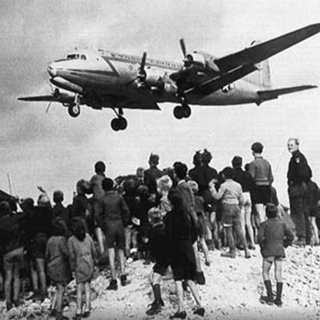
237. Citizen socialism at home, resisting the Soviets abroad
What Attlee’s government had shown was that, though it regarded itself as Socialist, it was a very distinctive kind of Socialism and heavily influenced by Liberal thinking. Where a more Marxist Socialist would take a class-based approach to politics, for Attlee the central figure was the Citizen and Citizens inhabited every class. Hence his universalist approach to social services, available to anyone who needed them irrespective of status. At the same time, he would not forbid those with the means to buy themselves other services, if they chose, from the private sector.His opposition to a harder-line brand of socialism had its corollary in his deep suspicion of Soviet behaviour internationally. His government invested whatever it needed to develop an independent British nuclear deterrent. It also became a founder member of NATO, and it also committed British forces to two major responses to Soviet aggressive moves: the Berlin airlift against the Soviet blockade on West Berlin, and the war in Korea, under the UN flag, against a Northern invasion of the South.Unfortunately, these military commitments, added on top of the need to control the remaining Empire, only added to the financial burdens on the government. That had led to a regime of austerity at home. In turn, the generated a widespread atmosphere of dissatisfaction with the government.As we’ll see, that wasn’t helpful in an election year.Illustration: A plane in the Berlin Airlift flying above children watching it come into Tempelhof Airport. NATO photographMusic: Bach Partita #2c by J Bu licensed under an Attribution-NonCommercial-No Derivatives (aka Music Sharing) 3.0 International License
30 Mars 14min
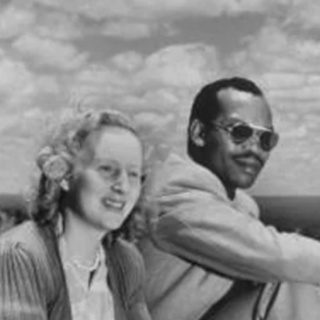
236. Greyness at home, decline abroad
Of the five ‘giant evils’ William Beveridge identified, the Attlee government set out to deal with want through social security, squalor through better housing, ignorance through more schooling and disease through the National Health Service. When it came to the fifth giant, idleness, the government’s tackeld unemployment by setting out to rebuild the British economy and, overall, that didn’t go too badly. Unemployment was kept to 2% of the workforce despite the return of two and a half million men to the employment market from the army, and a massive trade deficit was wiped out. But the price was a tough economy with rationing still in place and little in the way of luxury to make life more pleasurable. Survival had been made easier, but living was short of joy in a rather dour postwar Britain.Greyness at home was reflected in continuing decline abroad. This episode traces the loss of status and, indeed, of value of the pound, once the world’s reserve currency, now forced aside by the dollar. It also looks at the sad story of how Britain handled, or rather mishandled, its territory of Bechuanaland in Southern Africa, behaving shamefully towards its hereditary ruler Seretse Khama and his white wife Ruth Williams, to accommodate the growing racism of South Africa, source of the uranium Britain needed for its A-bomb.Things went no more smoothly in Palestine, where Britain simply abandoned its mandate, leaving Jews and Arabs to sort out their differences themselves, kicking off the long series of repeating wars that have poisoned the existence of Israel ever since. To cap the episode off, we talk about the start of the Malaya emergency, a counter-insurgency war as ugly and as strewn with atrocities as any other. It underlines the lesson that it isn’t government intentions that matter in such conflicts, it’s the nature of colonial war itself that makes it vile.Illustration: Seretse Khama, first President of Botswana, and the first First Lady, Ruth WilliamsMusic: Bach Partita #2c by J Bu licensed under an Attribution-NonCommercial-No Derivatives (aka Music Sharing) 3.0 International License
23 Mars 14min
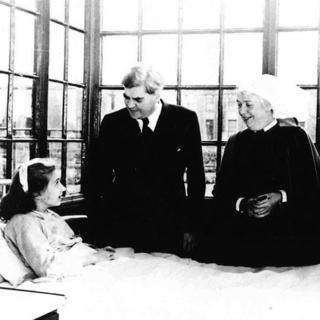
235. Clem against the Evil Giants
In the July 1945 general election, the British public offered Winston Churchill, as he put it himself, the ‘order of the boot’. A victorious war Prime Minister was kicked out. In his place, his deputy, the Labour leader Clem Attlee became Prime Minister.There was massive enthusiasm for the Attlee government in the working class, which extended to many soldiers. These were the people let down after the First World War when the promise of a ‘Land fit for Heroes’ was betrayed. They, and the government they elected, weren’t going to let that happen again.But does that mean that the Attlee government was socialist? In this episode, we study the social reforms it introduced and how they built on advances made by earlier radicals, many of whom were not socialist. In particular, the principal inspiration for those reforms came from William Beveridge, author of the Beveridge Report. Far from being a socialist, he was a Liberal, even briefly a Liberal MP.He'd identified five giant evils, want, ignorance, squalor, disease and idleness. This episode looks at the reforms designed to address the first four of these. The fifth, idleness, we’ll return to later.Illustration: Nye Bevan talking to a patient in Park Hospital, Trafford, Manchester, on the first day of the NHS, 5 July 1948. Image: Trafford Healthcare NHS/PA WireMusic: Bach Partita #2c by J Bu licensed under an Attribution-NonCommercial-No Derivatives (aka Music Sharing) 3.0 International License
16 Mars 14min
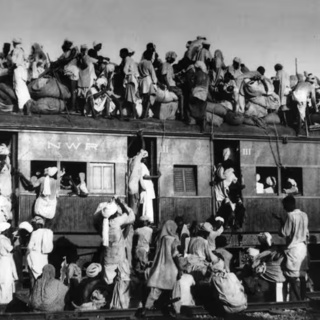
234. Fall of an iron curtain and of a jewel from the crown
It was a strange world that emerged from the Second World War.Both genocide and the mass killing of civilians, above all through bombing, culminating with the A-bombs dropped on Japan, had become somehow normalised. They rather weaken the case of the developed nations, which made these things happen, denouncing ethnic cleansing and terrorist bombs when they happen again today.The Soviet Union had massively extended its control of territory and what Churchill called an ‘iron curtain’ had as a result descended across Europe, dividing the continent in two.As for Britain, it had emerged broke, a condition it might have hoped the US would help with, discovering with some shock that actually the aid that flowed in under lend-lease would be stopping far more quickly than expected. Instead, the British government would have to negotiate a loan, which it finally paid off sixty years later.As for its imperial role, the Empire was beginning to fall apart. The major step was the independence of India, something on which the new Prime Minister, Clement Attlee, had been keen for a long time. Sadly, it was done too quickly and botched, amongst massive violence and bitterness, especially with the partition of India to allow the creation of Muslim Pakistan. The violence and pain continued to decades, with wars and genocidal actions, not just in India and Pakistan but also in the other parts of the British Indian empire, Burma (Myanmar) and Ceylon (Sri Lanka). That rather leads to the question, might it not have been better had Britain never set out to rule India in the first place?Illustration: Muslim refugees attempting to flee India sit on the roof of an overcrowded train near Delhi in September 1947. From The Guardian. Photograph: APMusic: Bach Partita #2c by J Bu licensed under an Attribution-NonCommercial-No Derivatives (aka Music Sharing) 3.0 International License
9 Mars 14min

233. Shocks and surprises at the war’s end
Following the German surrender in May 1945, the ‘Big Three’ – the United States, the Soviet Union and Britain – met for the third and last time in conference. And this time, appropriately, they met on German territory, in Potsdam near Berlin. It was Soviet-held territory too, perhaps significant given the power with which the Soviet Union was emerging from the war.Indeed, its delegation was the only one to keep the same leader, Joseph Stalin, at its head, as he had been at Tehran and Yalta. Roosevelt had died. As for the British, after nearly ten years without a general election, they finally held one, and to general surprise, the victorious war Prime Minister Churchill was defeated by his deputy, Clement Attlee, the Labour leader. Attlee would form the first ever Labour government with a parliamentary majority. He would also take over from Churchill as leader of the British delegation at Potsdam.The conference took place under the shadow of the first successful test of a nuclear device, the day before the conference started. The US was now a nuclear power. That gave it quite an edge in international power politics.Although the device had been designed to use against Nazi Germany, since only Japan was left in the war, and given how high the casualties would be in an invasion of the Japanese home islands, the Americans dropped an atom bomb on Hiroshima on 6 August 1945. To make sure the message had got through, they dropped another on Nagasaki on the 9th. The Japanese surrendered on the 15th, the only concession to their sensibilities being that the Emperor was not deposed. When the final Japanese surrender document was signed on 2 September, World War 2 was at last over. Illustration: The A-bomb dome in Hiroshima, Japan. Public DomainMusic: Bach Partita #2c by J Bu licensed under an Attribution-NonCommercial-No Derivatives (aka Music Sharing) 3.0 International License
2 Mars 14min
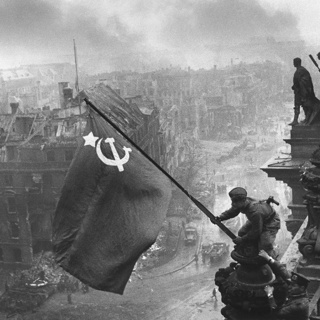
232. Bickering allies win in Europe
At the Yalta conference, between the US, the Soviet Union and Britain, the tensions between the Allies became increasingly obvious. Representing Britain, Churchill wanted the Allies’ war effort to be directed in such a way as to limit Soviet control over Central and Eastern Europe. The Soviets wanted to make sure they maximised the area they controlled. And given how powerfully they were surging towards Germany, it was hard to see how they could be blocked. Certainly, the Americans saw no way to stop them and weren’t prepared to go along with Churchill’s schemes for trying.The result was that the Soviets ended up completely controlling such nations as Poland and Czechoslovakia, and several other countries of Eastern Europe. They also got to Berlin first and symbolically planted a Soviet flag on top of the German Reichstag (parliament) building. With Hitler committing suicide while Soviet forces were only 500 metres away, this meant that when the Nazis surrendered on 8 May (to the western powers) or 9 May (to all the Allies including the Soviets), Stalin was in a powerful position among the victors.Illustration: A Soviet soldier plants a flag on the Reichstag building in Berlin. Public DomainMusic: Bach Partita #2c by J Bu licensed under an Attribution-NonCommercial-No Derivatives (aka Music Sharing) 3.0 International License
23 Feb 14min
